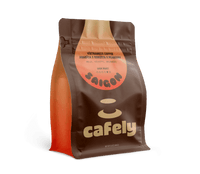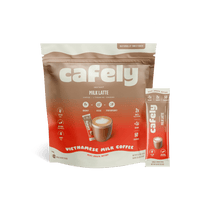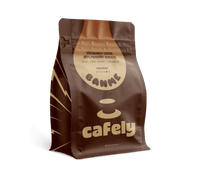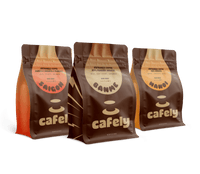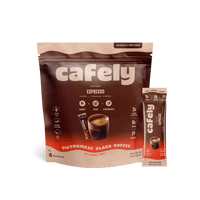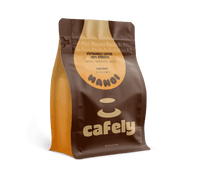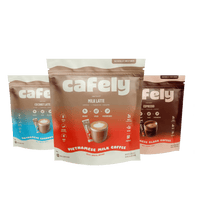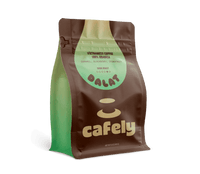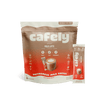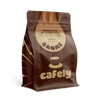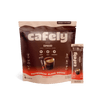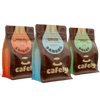Those stomach rumbles after drinking your morning coffee aren’t as rare as you might think. In fact, almost a third of people report needing to go to the bathroom after consuming it. But why does this happen?
We’ll explore exactly why coffee makes you poop, from the beans themselves down to the sweeteners you’re putting in it.
Caffeine & Bowel Movements
One of the primary reasons that your morning coffee might require a swift bathroom visit shortly afterward is the active ingredient itself — caffeine.
Caffeine is an all-natural stimulant — and what do stimulants do? They speed up various cellular processes in your body. Most people might notice both their breathing and heart rate increases after drinking coffee — so too does your digestion and gut motility.
The higher the caffeine content in your brew, the more stronger this effect. So, those drinking highly caffeinated coffee, such as Vietnamese robusta and arabica, may find themselves needing to go to the bathroom pretty quickly — sometimes within minutes of drinking it.
Coffee & Gut Health
Coffee stimulates the body’s gastric, biliary, and pancreatic secretions — speeding up the initial digestion processes taking place in your gut [1].
It also boosts the peristaltic movement of your small intestines your colon, meaning that your meal gets to its final destination faster, thanks to the secretion of hormones like cholecystokinin. It’s also believed that other hormones like gastrin and motilin, and molecules like exorphins, which are also found in coffee could also be responsible for this effect [2].
The Gastrocolic Reflex
If you’ve ever wondered why this urge mainly happens with your morning coffee, something called the gastrocolic reflex is to blame. This is a natural process that occurs within the body whether you have had coffee or not.
The gastrocolic reflex increases movement in the colon and intestines, effectively pushing food through so that more can take its place in the digestive system. It’s particularly active in the morning, as your body gets ready for the food you’re going to eat that day.
So, when you drink your morning coffee, this reflex is in its particularly sensitive period, meaning that it starts to speed things along. Most people prefer their morning coffee hot, and this also plays a factor. The warm liquid is like a nice bath for your insides, making the muscles of your digestive tract relax, reducing resistance, and effectively facilitating a smooth journey.
Coffee Additives & Lactose Sensitivity

It’s not just the coffee itself but also what you add to it that can affect whether you need to head to the bathroom.
For example, adding milk or other dairy products to your coffee can make your need to go to the bathroom greater if you have a sensitivity to lactose. Your body will react to it with symptoms like bloating, diarrhea, stomach pain, and nausea.
If you like your coffee sweet, see if what you’re using impacts your digestive function. Some sweeteners (polyols such as sorbitol, xylitol, and erythritol) produce an undesirable effect on your bathroom habits and can have a laxative effect.
If you find that your morning coffee poops are a little bit too uncomfortable, change up and experiment with your coffee additives until you find a balance that best suits you and your gut.
Individual Differences & Sensitivity
One of the biggest factors in how coffee affects you is, well, you! The way your body reacts to coffee comes down to your genetics, as well as other factors such as preexisting conditions or your digestive health.
For example, those who suffer from IBS are likely to feel the effect of coffee and any additives much more than other people. On top of that, women seem to also be the most susceptible, with 65% of them reporting that coffee makes them poop [3].
If it’s too much of an issue, choosing a lower-caffeine alternative or drinking coffee at a different time of day may help with symptoms, or you might want to cut it out altogether.
FAQs: Why Does Coffee Make You Poop?

Still bursting with questions about coffee and its effects? Our FAQs should have you covered.
1. Is coffee a natural laxative?
Essentially, coffee is a natural laxative thanks to the hormones it contains that stimulate the digestion process and the gastrocolic reflex. However, its effects may be more pronounced in some.
2. Can decaf coffee also make you poop?
Although caffeine is one of the biggest factors behind coffee making you poop, there are still lots of things common to coffee, both regular and decaf, that can make you go to the bathroom. These include hormones like cholecystokinin, gastrin, and motilin, as well as molecules such as exorphins.
Related: How Is Decaf Coffee Made?
3. How can I reduce the laxative effect of coffee?
If you want to reduce coffee’s effects on you, try a weaker blend. If you normally drink a strong robusta that’s high in caffeine, try a pure arabica blend like Cafely’s Da Lat. Or, you might want to cut the caffeine entirely and go for a decaf option.
If neither of these work, try taking a look at what you are adding to your coffee such as milk or sweeteners, as they could also be a reason why you might need the bathroom.
4. Does the time of day affect how coffee influences bowel movements?
You’re more likely to notice the effect of coffee on your bowel movements in the morning. This is because it syncs up to a time when the gastrocolic reflex is particularly sensitive. The gastrocolic reflex is responsible for moving food through your body, and coffee helps to speed it along.
Related: When Is the Latest Time to Drink Coffee
5. Are there any health risks associated with coffee-induced pooping?
There aren’t any health risks associated with coffee making you poop, but in some people, it can lead to discomfort, particularly if they have a sensitivity to caffeine or even to additives such as milk due to its lactose content.
6. Can everyone drink coffee on an empty stomach?
Drinking coffee on an empty stomach can be uncomfortable for some, as it can increase acid levels in your esophageal tract and aggravate your digestive system if it’s the only thing sitting in your stomach. It’s best to ensure your coffee has some company by drinking it with or after your breakfast.
7. Does the brewing method affect how coffee impacts digestion?
The stronger the coffee, the more potent its effects, including its caffeine content. So, a stronger brew will impact your digestion more.
8. What are the long-term effects of relying on coffee for regular bowel movements?
For some people, their morning coffee can help with a regular bowel rhythm, but it’s important not to become dependent on its effects. If coffee is the only thing that can get your bowel moving then there could be other issues at play which you should speak to your doctor about.
9. Can I drink coffee if I have digestive disorders like IBS?
You can drink coffee if you have IBS, but it can make your symptoms worse. Try going for a decaf coffee with little to no additives in it, or if you are still in doubt, have a chat with your doctor or nutritionist to see if it is right for you.
10. How quickly does coffee make you poop?
This varies from person to person. Some people can have the urge to go to the bathroom within minutes, and for others, it could take up to half an hour for the effects to make themselves known. Stronger brews are much more likely to take effect much quicker than others.
References
- Nehlig, A. (2022). Effects of Coffee on the Gastrointestinal Tract: a Narrative Review and Literature Update. Nutrients, 14(2), 399.
- Iriondo-DeHond, A., Uranga, J. A., del Castillo, M. D., & Abalo, R. (2020). Effects of Coffee and Its Components on the Gastrointestinal Tract and the Brain-Gut Axis. Nutrients, 13(1).
- Brown, S. R., Cann, P. A., & Read, N. W. (1990). Effect of coffee on distal colon function. Gut, 31(4), 450–453.
